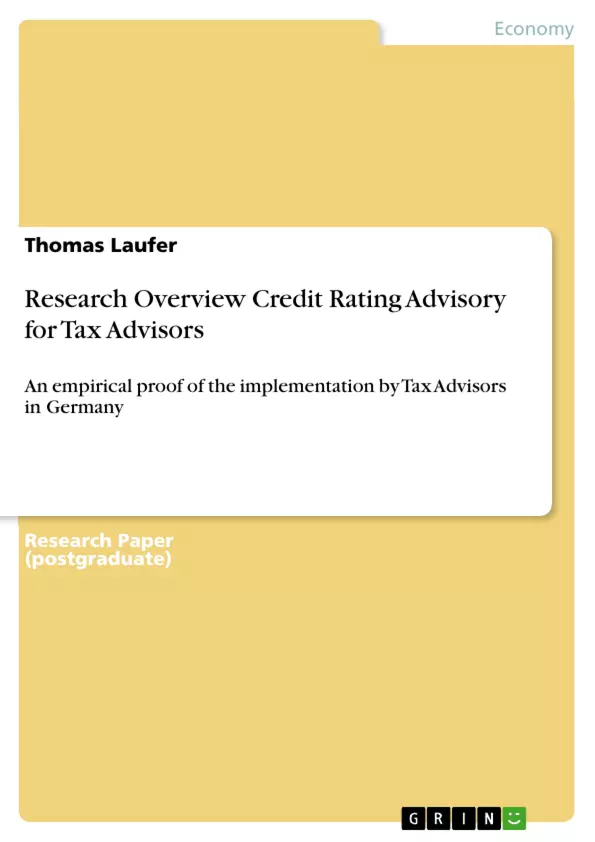According to a study by Sutter, 56% of tax consultancies in 2005 viewed their position in a twoyear
outlook as "rather good“, with 11% even finding the outlook "very good“. On the other end
of the scale, the pessimists comprised merely 11% of the respondents, judging their perspective
as "rather bad“. 30% had neutral expectations and 2% made no indication.
The optimism in the meantime has been rather restrained. The general economic crisis soured
the mood of 2005. The 2008 branch report by Sparkassen Finanzgruppe for the branches of
auditors and tax consultancies draws a conclusion that turnovers of tax consultancies saw a
negative development already in the fourth quarter of 2007. The income of tax consultancies in
fees mainly depends on turnover and profits of commercial enterprises, which means that the
negative market trends for tax consultancies follow with a delay the general developments.[...]
Inhaltsverzeichnis (Table of Contents)
- Introduction
- Subject Matter of the Thesis
- Basics on Market Trends in the Tax Consultancy Branch
- Competitive Pressures upon Tax Consultants by Other Service Providers
- Extension of the Scope of Operations in Response to Market Trends
- Definition of Credit Rating Advisory Services
- Breakdown of Subject Matter into Two Main Parts and Partial Hypotheses
- Objectives and Methodology
- The Underlying Cause and the Thesis Objective
- Basic Thesis Breakdown into Partial Theses
- Transforming the Partial Theses into Hypotheses
- Generally on the Hypotheses
- Hypothesis from Partial Thesis 1
- Hypothesis from Partial Thesis 2
- Hypothesis from Partial Thesis 3
- Hypothesis from Partial Thesis 4
- Method for Verifying the Partial Theses
- Method for Examining the Credit Rating Advisory Services - Hypotheses 1 and 2
- Examination of the Potential for Credit Rating Advisory Services - Hypothesis 3
- Method for Implementation in the Market - Hypothesis 4
- Methodology of the Empirical Surveys
- Data Gathering Method under Both of the Surveys
- Weighting in the Survey According to Numbers of Authorised Tax Advisors
- Bank Selection and Assessment according to Regional Significance
- Summary of the Selection Criteria and Outline of the Research Method
- Desk Research
- Results
- Result for Hypothesis 1
- Statutory Tasks of Tax Consultants
- Activities of Tax Consultants Subject to Agreement
- Restrictions to Credit Rating Advisory Services under the Law of Tax Advisors
- Legal Restrictions to Credit Rating Advisory Services
- Verification of Hypothesis 1
- Result for Hypothesis 2
- Generally on Qualification for Credit Rating Advisory Services
- Verification of Hypothesis 2
- Generally on Hypotheses 3 and 4
- Preliminary Note on Hypotheses 3 and 4
- The Planned Sample Size
- The Sample of Banks to Include in the Selection
- The Sample of Tax Consultants to Include in the Selection
- Initial Pretest Ahead of the Survey
- Implementation of the Data Collection Effort
- Result for Hypothesis 3
- Return Rate in the Survey
- Sample Spread
- Evaluation of the Results of the Online Survey: General
- Evaluation of the Online Survey - Rating Practices by Banks
- Evaluation of the Online Survey - Bank Internal Measures
- Evaluation of the Online Survey - Impact on Rating
- Verification of Hypothesis 3
- Result for Hypothesis 4
- The Return Rate in the Survey
- Sample Spread
- Evaluation of the Online Survey - Current Credit Rating Advisory Services
- Evaluation of the Online Survey - Future Potential
- Verification of Hypothesis 4
- Discussion
Zielsetzung und Themenschwerpunkte (Objectives and Key Themes)
This thesis empirically investigates the implementation of credit rating advisory services by tax consultants in Germany. The objective is to analyze the market potential and feasibility of such services, considering legal restrictions and the qualifications of tax consultants. The research employs a mixed-methods approach, combining desk research with empirical surveys of banks and tax consultants.
- Market potential for credit rating advisory services offered by tax consultants in Germany.
- Legal and regulatory framework governing the provision of such services.
- Qualifications and expertise required by tax consultants to offer credit rating advisory services.
- Feasibility of implementing credit rating advisory services within tax consultancy firms.
- Perspectives of banks regarding the utilization of credit rating advisory services from tax consultants.
Zusammenfassung der Kapitel (Chapter Summaries)
The introduction defines the subject matter and outlines the thesis’s structure. Chapter 2 details the research methodology, including the hypotheses and the survey design. Chapter 3 covers the desk research conducted to establish the existing legal framework. Chapter 4 presents the results of the empirical surveys conducted among banks and tax consultants. (Note: Summaries of the Conclusion and Chapter 5 are omitted to avoid spoilers.)
Schlüsselwörter (Keywords)
Credit rating advisory services, tax consultants, Germany, empirical research, market analysis, legal framework, professional qualifications, survey methodology, bank perspectives.
Frequently Asked Questions
Can tax consultants in Germany offer credit rating advisory services?
Yes, the thesis investigates this possibility, exploring the legal framework and restrictions under the Law of Tax Advisors (Steuerberatungsgesetz).
Why is credit rating advisory becoming important for tax consultancies?
Due to negative market trends and competitive pressures, tax consultants are looking to extend their scope of operations beyond traditional tax filing.
What qualifications are required for credit rating advisory?
The research evaluates whether the standard training of tax consultants provides sufficient expertise or if additional qualifications are necessary to advise clients on bank ratings.
How do banks perceive tax consultants as credit rating advisors?
The study includes empirical surveys of banks to determine their perspective on the quality and impact of ratings influenced by tax consultant advisory services.
What is the market potential for these services in Germany?
The thesis uses online surveys and empirical data to verify the future potential and current implementation of credit rating services within the tax consultancy branch.
- Quote paper
- Dr. Thomas Laufer (Author), 2011, Research Overview Credit Rating Advisory for Tax Advisors, Munich, GRIN Verlag, https://www.grin.com/document/183264



